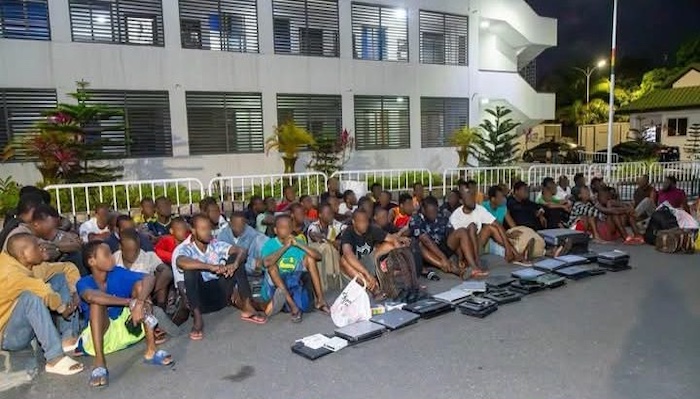Police in Ghana have rescued 57 Nigerians who were trafficked into the country and forced into cybercrime activities, authorities confirmed on Thursday, October 23.
The victims, all between the ages of 18 and 26, were freed during a police raid on a building in a suburb of Accra on Wednesday. According to a statement from the Criminal Investigations Department (CID), the victims had been coerced into running online romance scams after being lured to Ghana with false promises of lucrative jobs and opportunities.
During the operation, police recovered 77 laptops, 38 mobile phones, two vehicles, three television sets, and other internet-enabled devices believed to have been used in the illegal scheme. Five suspects were arrested in connection with the cybercrime and human trafficking ring.
“Upon arrival, the victims were coerced into engaging in online romance scams and other heinous activities,” the CID said, adding that all rescued individuals are currently receiving necessary care and support. Authorities, however, did not specify when the victims would be repatriated to Nigeria.
The incident underscores the growing concern over human trafficking networks in West Africa that exploit young people for cyber fraud and prostitution. Despite several police crackdowns, such operations remain widespread in Ghana.
According to Ghana’s Ministry of Gender, Children and Social Protection, the government secured 79 prosecutions and 54 convictions for human trafficking offences between 2023 and 2024.
The latest rescue comes amid a broader continental crackdown on cybercrime. Last month, Interpol announced the arrest of 260 suspects across 14 African countries involved in online romance and extortion scams that targeted over 1,400 victims, resulting in losses of nearly $2.8 million.
In that operation, Ghanaian authorities alone arrested 68 suspects accused of using fake identities to extort victims and secretly record explicit content for blackmail.
The Ghanaian police say investigations into the latest case are ongoing as efforts continue to dismantle regional cybercrime and trafficking networks.
Melissa Enoch

